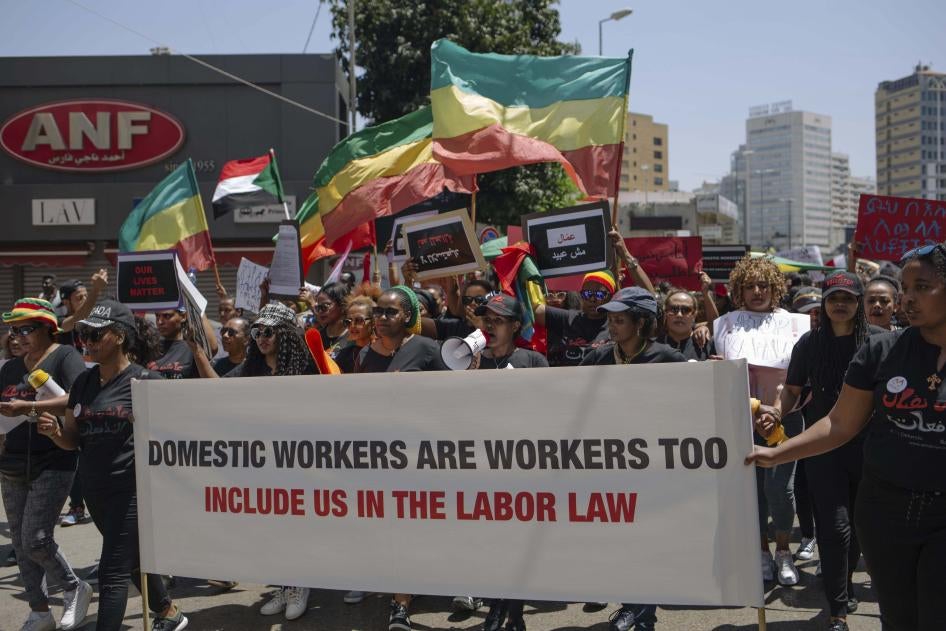Hardly anyone in Lebanon has been left unscathed by the economic crisis, the worst since the end of the civil war in 1990. Its impact has been most devastating on communities already marginalized prior to the crisis. The situation for the estimated 250,000 migrant domestic workers, for instance, who are excluded from labor law protections, has gone from bad to worse.
Prior to the economic crisis, individuals and businesses used US dollars and Lebanese lira interchangeably at the official exchange rate of LL1,515 to the dollar. But as economic growth stalled, and remittances from the Lebanese diaspora decreased (dropping by 7 percent in 2017), dollars became increasingly scarce. Banks introduced informal capital controls, restricting the dollars people can withdraw or transfer abroad. As a result, the value of Lebanese lira has dropped by almost 40 percent in the unofficial market since October 2019, and the price of imported goods has risen exponentially.
Businesses have either been forced to close or have drastically reduced their operations. InfoPro Research, a Beirut-based market research and polling firm, estimated that between October 2019 and February 2020, more than 220,000 people lost their jobs. They also estimated that one third of all companies have reduced their workforce by 60 percent, and half of the companies surveyed have reduced salaries by more than 40 percent.
Already vulnerable
Domestic workers, who lack any protections under the law and have virtually no access to judicial redress, have also suffered severe consequences. Many domestic workers have reported that their employers slashed their salaries—if they paid them at all. But even the more fortunate workers who are still receiving their salaries in full have seen their money’s value decrease by almost a third as the Lebanese lira depreciates. A worker who used to earn LL300,000 per month could transfer $200 to her family abroad. Now, the same salary can get her as little as $120 at the unofficial exchange rate, which fluctuates day to day at the sarraf (exchange shop). Projections indicate that the lira may depreciate even further.
Making matters worse, even though some migrant workers stand to effectively lose out on half of their pay or more, they cannot readily leave their employers or advocate for better pay or conditions. Their presence is regulated under a kafala (sponsorship) system—which former Labor Minister Camille Abousleiman likened to “modern-day slavery”—under which they cannot leave or change jobs without their employer’s consent. Giving employers this level of control over workers’ lives has led to an array of abuses that Human Rights Watch has been documenting for years, including non-payment of wages, forced confinement, no time off, and verbal, physical, and sexual abuse.
In December, the Philippines embassy in Lebanon said that more than 1,000 Filipino workers who “have recently lost jobs and income opportunities” registered for their free repatriation program. At the time of writing, no other embassy has offered similar services to its nationals in Lebanon.
Right old wrongs
For years, the Lebanese government has been shirking its duty to protect migrant domestic workers, leaving employers, recruitment agencies, and embassies to manage the working relationship—often with disastrous consequences for the workers. As the economic crisis worsens and the situation of migrant domestic workers becomes even more precarious, the government should no longer look the other way.
Last year, a colleague and I represented Human Rights Watch in a working group headed by the International Labour Organization and established by then-Labor Minister Abousleiman to dismantle the kafala system. In July, we sent the minister our recommendations for legislative and policy changes. If these changes were carried out, they would help create a fairer labor relationship, including by allowing domestic workers to choose to terminate their contract. However, the minister resigned soon after the outbreak of nationwide demonstrations, before he had a chance to see these reforms through.
The new Labor Minister, Lamia Yammine, has an opportunity to correct this historical injustice. Dismantling the kafala system will not solve the economic crisis, but it will ensure that the tens of thousands of women who left their homes and families to work in Lebanon are not left to bear the brunt of it.








